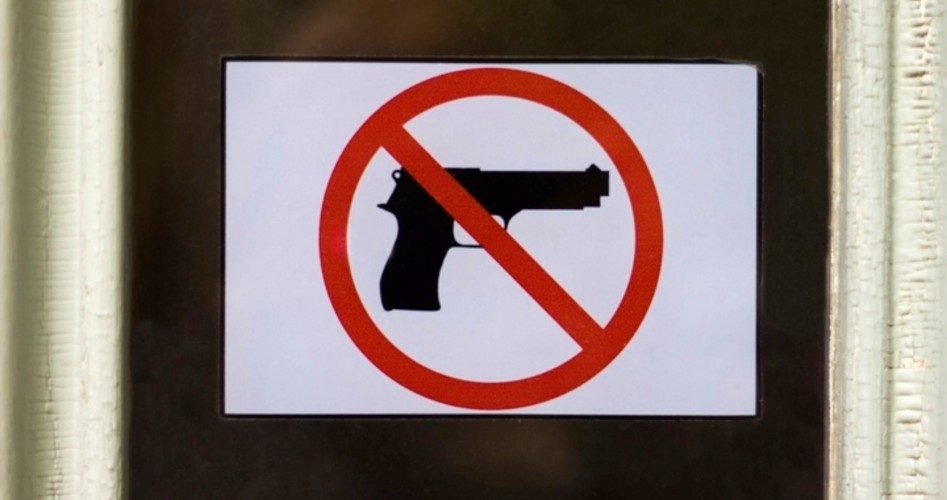
“There will be no opposition” to gun control, said one Kiwi, epitomizing his nation’s willingness to sacrifice liberty for (an elusive) security. In shock after last Thursday’s Christchurch massacres, which claimed 50 lives, New Zealanders obviously have forgotten the sage counsel “Haste makes waste” and “Look before you leap.” As a result, the country’s leaders and citizens will further limit people’s capacity for self-defense — perhaps even going so far as to outlaw all semi-automatic rifles.
New Zealand “Prime Minister Jacinda Ardern said her Cabinet will consider the details of the changes on Monday,” reports the Washington Times. “She has said options include a ban on private ownership of semi-automatic rifles that were used with devastating effect in Christchurch and a government-funded buyback of newly outlawed guns.”
Since many aren’t acquainted with firearms, note that a “semi-automatic” weapon operates thus: One bullet is fired with every trigger pull. It is not a “machinegun,” which is a fully automatic firearm and, since 1934, has been almost impossible for the average citizen to acquire legally in the United States. Most of the guns in private hands in our nation today are semi-automatic — it has long been the norm.
The Times continues:
While curtailing gun owners’ rights is a political battleground in the United States, Christchurch gun owner Max Roberts, 22, predicted Ardern won’t face serious opposition to her agenda.
“There will be no opposition to it. There’s no movement in New Zealand for that. Our media and politics are more left wing,” said Roberts, a carpenter who uses guns for hunting.
Elliot Dawson, who survived the shooting at Christchurch’s Linwood mosque by hiding in a bathroom, hopes New Zealand follows Australia’s lead on gun control.
In Australia, a virtual ban on private ownership of semi-automatic rifles and a government-funded gun buyback cut the size of the country’s civilian arsenal by almost a third.
The ban followed a 1996 massacre in which a lone gunman used assault rifles to kill 35 people in Tasmania state in 1996.
“Personally, I don’t think guns should be legal at all. Maybe in some extreme self-defense, but I don’t think they need such firearms like that,” Dawson said.
One mistake here is that it’s never a good idea to craft policy in an emotionally charged environment, as “Passion governs, and she never governs wisely,” to quote Benjamin Franklin. Some justify doing so by saying that these are the moments when there’s the “political will,” but this is often just a euphemism for a demagogue-catalyzed, mob-involved emotional fit.
If new gun-control measures are a good idea now, they’ll still be a good idea in two months. So why not take that proverbial deep breath and 10-count and take time to give a matter due consideration?
Answer: Because this would be like waiting to legislate after the Reichstag fire. Those aiming to seize control never “want a serious crisis to go to waste,” as ex-Obama underling Rahm Emanuel put it.
Ironically, New Zealand and the wider Left are playing right into the hands of the shooter, 28-year-old Australian national Brenton Tarrant. He wrote a manifesto and explained in it that he perpetrated his act with firearms precisely because of the “affect it would have on social discourse, the extra media coverage they would provide and the affect it could have on the politics of United states [sic] and thereby the political situation of the world.” He aimed to catalyze a removal of gun rights (which, he believed, would evoke a strong reaction from the right — and this, he hoped, would spark a U.S. civil war).
The second irony is that Tarrant also explained very well why gun control would’ve done nothing to stop him. “I could have chosen any weapons or means,” he stated. “A TATP [triacetone triperoxide, a homemade explosive] filled rental van. Household flour, a method of dispersion and an ignition source. A ballpeen [sic] hammer and a wooden shield. Gas, fire, vehicular attacks, plane attacks, any means were available. I had the will and I had the resources.” But he chose firearms for “marketing.”
Tarrant, who survived his crime and is in custody, is a highly intelligent, sane man (as evidenced by his quite literate manifesto) who planned his massacre meticulously. Thinking that some value-signaling gun-control measure would have stopped him is like believing in unicorns.
There’s also no evidence that it would prevent garden-variety wickedness, either, as there’s no correlation between stricter gun laws and lower crime/murder rates. There are nations with far stricter gun laws than the United States but higher murder rates; Russia, Mexico, and Brazil are examples. There are also countries with high gun-ownership rates but very little homicide, such as Israel and Switzerland (which has one of the 20-lowest murder rates in the world).
Moreover, while gun-control zealots portray the United States as a wild west of murder and mayhem, our nation actually ranks only 83rd in homicide rate on a list of the world’s countries. Of course, it’s true that the U.K., often cited by gun-grabbers, has an even lower rate. It’s seldom pointed out, however, that New Hampshire has both a far higher gun-ownership rate than the U.K. but also a lower murder rate. Explanation? Demographics.
As I wrote in 2015:
As Dr. Thomas Sowell put it in 2012, “Neither guns nor gun control is the reason for the difference in murder rates. People [are] the difference.”
A major factor in the U.S. murder rate having dropped during the last few decades is that the proportion of young people — the age demographic with the highest crime rate — has dropped as our society has grayed. There are other demographic correlations, too. As Sowell wrote, “The rate of gun ownership is higher in rural areas than in urban areas, but the murder rate is higher in urban areas. The rate of gun ownership is higher among whites than among blacks, but the murder rate is higher among blacks.”
Then there’s an even more striking example. Japan, which has strict gun control, “technically” has the world’s fifth-lowest homicide rate (critics point out that, due to the application of different criteria, that nation’s actual rate is twice the reported one). Yet Japanese-descent Americans living in the United States — under our relatively lenient gun-control laws — have a murder rate half that of Japanese living in Japan.
Of course, none of this will matter to people who believe in legislation without cogitation. When the wolves in shepherds’ clothing want control and the sheep want a sense of security, illusory though it may be, misguided passion will do just fine.


